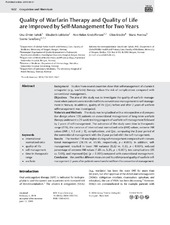Quality of warfarin therapy and quality of life are improved by self-management for two years
Sølvik, Una Ørvim; Løkkebø, Elisabeth Sellevoll; Kristoffersen, Ann-Helen; Brodin, Ellen Elisabeth; Averina, Maria; Sandberg, Sverre
Peer reviewed, Journal article
Published version

Åpne
Permanent lenke
https://hdl.handle.net/1956/23493Utgivelsesdato
2019Metadata
Vis full innførselSamlinger
Originalversjon
https://doi.org/10.1055/s-0039-1693703Sammendrag
Background: Studies from several countries show that self-management of vitamin K antagonist (e.g., warfarin) therapy reduce the risk of complications compared with conventional management. Objectives: The aim of this study was to investigate the quality of warfarin management when patients were transferred from conventional management to self-management in Norway. In addition, quality of life (QoL) before and after 2 years of warfarin self-management was investigated. Materials and Methods: The study was longitudinal with a retrospective and prospective design where 126 patients on conventional management of long-term warfarin therapy underwent a 21-week training program of warfarin self-management followed by 2 years of self-management. The outcomes of the study were time in therapeutic range (TTR), the variance of international normalized ratio (INR) values, extreme INR values (INR ≤ 1.5 and ≥ 5), complications, and QoL, comparing the 2-year period of the conventional management with the 2-year period with the self-management. Results: The median TTR was higher during self-management compared with conventional management (78.1% vs. 65.9%, respectively, p < 0.001). In addition, self-management resulted in lower INR variance (0.22 vs. 0.33, p < 0.001), reduced percentage of extreme INR values (1.8% vs. 5.3%, p < 0.001), less complications (0% vs. 5.6%), and improved QoL (p < 0.001) compared with conventional management. Conclusion: We used five different measures and found improved quality of warfarin self-management 2 years after patients were transferred from the conventional management.
